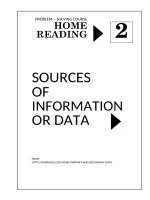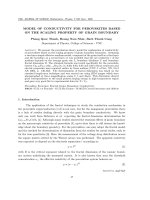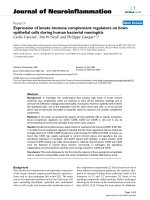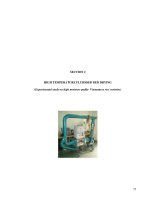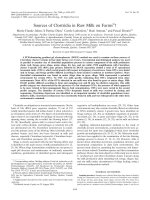Sources of information for agricultural students on online meeting tools during Covid-19 lock down
Bạn đang xem bản rút gọn của tài liệu. Xem và tải ngay bản đầy đủ của tài liệu tại đây (238.81 KB, 6 trang )
Int.J.Curr.Microbiol.App.Sci (2020) 9(7): 3470-3475
International Journal of Current Microbiology and Applied Sciences
ISSN: 2319-7706 Volume 9 Number 7 (2020)
Journal homepage:
Original Research Article
/>
Sources of Information for Agricultural Students on Online
Meeting Tools during Covid-19 Lock Down
M. Chenna Madhava1*, T. Lakshmi1, B. Ramana Murthy2,
S. Sravani1, V. Karthiga1, Amanda Baby1 and A. Nikhitha1
1
2
Department of Agricultural Extension, S.V. Agricultural College, Tirupati, ANGRAU
Department of Statistics and Computer Applications, S. V. Agricultural College, Tirupathi,
ANGRAU, India
*Corresponding author
ABSTRACT
Keywords
COVID-19, Lock
down, Institutional
Sources, Social
Media, WhatsApp
Article Info
Accepted:
22 June 2020
Available Online:
10 July 2020
The study was conducted to know the sources of information for
agricultural students on online meeting Apps during COVID-19 lock down
with a sample size of 150 respondents (i.e., Agricultural students studying
in Agricultural Higher Education Institutions across A. P, Telangana,
Karnataka, Tamil Nadu, Kerala). In this study 68% of respondents revealed
that Teaching staff and officials of Agricultural Higher Education
Institutions (Institutional Sources) are the major contributors in creating
awareness about online meeting Apps among Institutional, Non
Institutional and Mass Media Channels. 88.7% of the respondents opined
that Social Media is major contributor among Print, Electronic, Social
Media channels and 68.7% of respondents revealed that WhatsApp have
played crucial role among Social Media Platforms in awareness creation
about virtual meeting Apps. This study also revealed that, Age and Level of
education/type of degree are the major influencing factors in a decision to
choose a particular meeting App for their online classes.
Introduction
It is a well known fact that COVID-19 had
shown staggering impact on global education
system. Worldwide there are more than 1.2
billion learners in 186 countries are out of
class room due to the pandemic (source:
UNESCO).
As the corona virus pandemic started
affecting India, all the colleges and schools
along with Agricultural higher education
institutions closed physically due to
pandemic-led lock down. There are as many
as 1.65 lakh students are pursuing various
Undergraduate, Postgraduate and Doctoral
programmes
in
various
Agricultural
3470
Int.J.Curr.Microbiol.App.Sci (2020) 9(7): 3470-3475
institutions
(2019-20;
/>across
the
country were impacted due to pandemic and
their academic activities were significantly
disrupted.
Based on UGC Guidelines for the
Universities in view of COVID-19 pandemic
and in consultation with academic experts and
administrators of agricultural universities, the
ICAR has taken several immediate measures
to ensure continuity in teaching- learning
process. ICAR along with NAHEP, NARES
responded well to the situation and started
taking advantage of technology to bring
classes online via various online meeting
apps.
But, the challenge is to find the best online
conferencing solution for specific e-Learning
needs, especially when there are so many
options available and also many students are
unaware
of
online
meeting
apps
beforeCOVID-19 lock down. Keeping all
these things in mind this study was conducted
to know what are the major informational
sources that has been contributed significantly
to create awareness about online meeting apps
among the agricultural higher education
students during lock down period and also to
know the role of demographics in choosing
particular online meeting app.
Materials and Methods
The data were collected during June, 2020 on
a structured survey schedule administered as
an online survey using Google forms and data
were collected purposively from A.P,
Telangana, Tamil Nadu and Kerala states. A
total of 150 respondents have been selected
on simple random basis from various
Agricultural Higher Education Institutions
studying in these 5 states. Care has been taken
to eliminate multiple responses during the
online survey and all the respondents included
in the sample are unaware of online meeting
Apps before pandemic-led lockdown.
The data collected was categorized and
tabulated according to demographics, type of
online meeting App used, sources of
information in awareness creation.
The Pearson chi square test (χ2) was
performed to know the significance of
association between the demographics of the
respondents and type of online App used,
sources of information in awareness creation.
The computation was done by using SPSS
statistical program.
Results and Discussion
Distribution of respondents according to
demographics
Results pertaining to distribution of
respondents according to demographic
characteristics is presented in table 1. The
findings shows that highest number of
respondents belongs to the 21-25 years age
group (70.7%) followed by 16-20 years age
group (25.3%) and 26-30 years (2.7%) and
least number of respondents are in >30 years
age group(1.3%). This might be due to the
most of the students studying in Agricultural
Higher Educational Institutions are in
between 21-25 years, 16-20 years and there
are few students belongs to >30 years are
studying in these institutions. Then 58.7% of
the respondents are females and 41.3% of the
respondents are males.
The highest number of respondents are
pursuing Under graduation (56.7%) followed
by Post graduation (40%) and PhD
(3.3%).These results are in the order of (i.e.,
Under graduation, Post graduation, PhD
respectively)total
number of students
pursuing these 3 degree programmes in
various Agricultural Higher Education
Institutions.
3471
Int.J.Curr.Microbiol.App.Sci (2020) 9(7): 3470-3475
Distribution of respondents according to
type of online meeting App used
Table 2 clearly shows that 52.7% of the
students are using Zoom mobile application
for their online classes followed by Google
Meet
(38.7%),
Webex
(4.6%)
and
Others(4.0%).
Distribution of respondents according to
sources of information in awareness
creation
From the Table 3, highest number of
respondents (68%) opined that Teaching staff
and officials of Agricultural Higher Education
Institutions (Institutional/Formal sources) are
major sources of information in creating
awareness about online meeting Apps
followed by Mass Media Channels (17.3%)
and Non Institutional/Informal sources i.e.,
Friends, Neighbours, Relatives, Family
members (14.7%). Past research on sources of
information suggesting that Mass Media
channels are actively involved at awareness
stage of any new technology. But in contrast
the results are showing that Institutional
sources have played crucial role in creating
awareness about online meeting Apps. The
reason might be awareness stage was
coincided with trial and adoption stages due
to an abnormal situation (Pandemic).
Table.1 Distribution of respondents according to demographics (N=150)
Variables
AGE
16-20 years
21-25 years
26-30 years
> 30 years
Frequency (N)
Percentage (%)
38
106
4
2
25.3
70.7
2.7
1.3
GENDER
Female
Male
88
62
58.7
41.3
EDUCATION
Under graduation
Post graduation
PhD
85
60
5
56.7
40
3.3
Source: Online Survey 2020
Table.2 Distribution of respondents according to type of online meeting app used (N=150)
Variable
Online Meeting App
Zoom
Google Meet
Webex
Others
Frequency (N)
79
58
7
6
Percentage (%)
52.7
38.7
4.6
4.0
Source: Online Survey 2020
3472
Int.J.Curr.Microbiol.App.Sci (2020) 9(7): 3470-3475
Table.3 Distribution of respondents according to sources of information
in awareness creation (N=150)
Variables
Major Sources of Information
Frequency(n)
Percentage (%)
Teaching staff and officials of
102
68.0
Friends, Neighbors, Relatives,
Family members
22
14.7
Mass Media Channels (Print,
Electronic, Social Media)
26
17.3
17
0
133
11.3
0
88.7
103
21
12
8
6
68.7
14.0
8.0
5.3
4.0
Agricultural Higher Education Institutes
Type of Mass Media Channel
Electronic Media
Print Media
Social Media
Type of Social Media Platform
You Tube
Face Book
Others
Source: Online Survey 2020
Table.4 Pearson Chi – square (χ2) values for demographics versus type of online meeting app
used, sources of information in awareness creation (N=150)
Online meeting app
used
Major sources of
information
Type of mass media
channel
Type of social
mediaplatform
AGE
20.001
0.018*
S
5.978
0.426
NS
9.471
0.024*
S
8.648
0.733
NS
χ2 VALUE
P –VALUE
SIGNIFICANCE
χ2 VALUE
P-VALUE
SIGNIFICANCE
χ2 VALUE
P-VALUE
SIGNIFICANCE
χ2 VALUE
P-VALUE
SIGNIFICANCE
GENDER
7.530
0.06
NS
3.571
0.168
NS
1.124
0.289
NS
3.721
0.445
NS
NOTE: * and ** indicates significance at 5% and 1% level of significance respectively.
NS= Non significant, S= Significant
3473
EDUCATION
27.546
0.00**
S
4.954
0.292
NS
4.408
0.110
NS
6.885
0.549
NS
Int.J.Curr.Microbiol.App.Sci (2020) 9(7): 3470-3475
88.7% of the respondents opined that Social
Media have contributed in awareness creation
followed by Electronic Media (11.3%) among
Mass Media Channels. Significantly highest
per cent of Social Media might be due to it’s
wide range of accessibility. But one important
finding in this study is that none of the
respondents (0%) have reported the role of
Print Media in awareness creation. This might
be due to the very low level of accessibility to
Print Media channels like news papers during
pandemic-led lock down.
Highest number of respondents (68.7%)
opined that WhatsApp have played important
role in awareness creation among various
Social Media Platforms followed by You
Tube (14%), Instagram (8%), Face Book
(5.3%) and Others (4%). The reason might be
due to WhatsApp will allow the people in
intense inter personal communication than
any other Social Media Platform and inter
personal channels will in turn act as a reliable
source of information.
Pearson chi square (χ2) test for
demographics versus type of online
meeting App used, sources of information
in awareness creation
Pearson chi square test results in Table 4
showing that there is a significant relationship
between the Age and type of online meeting
App used χ2=20.001, p=0.018, p<0.05.
It is also showing that there is there is a
significant association between the level of
education of respondent and type of online
meeting App used by him χ2 =27.546, p=
0.00, p<0.01. From here it is evident that level
of education/ type of degree will play a role in
decision to choose a particular meeting App
for their online classes.
There is a significant association between the
Age of the respondent and type of Mass
Media Channelχ2=9.471, p=0.024, p<0.05.
In conclusion, it was discovered that
Institutional Sources (Teaching staff and
officials of Agricultural Higher Education
Institutions) have played a crucial and very
important role in creating awareness about
virtual meeting tools and succeeding in
preparing the students for online classes for
teaching-learning continuity.
It was also found that Age and level of
education have played major role in choosing
a particular online meeting App for their
virtual classes.
The type of Mass Media Channel involved in
creating awareness about online meeting
Apps vary with the Age.
References
Thammi-Raju, D., Ramesh, P., Krishna, P.,
Soam, SK., Sriniasrao, Ch., Agarwal,
RC.
2020.
RE-imaging
Higher
Agricultural Education in India on the
Face of Challenge from COVID-19
Pandemic – Strategies for Adopting to
the New Normal. ICAR Policy Paper,
Indian Council of Agricultural Research
(ICAR), New Delhi, p14.
Milan Slavic (2004). Changes in information
systems in Czech agriculture, The
Journal of agricultural education and
extension 10 (4), 193-202, 2004.
Lou E. Riesenberg (1989), Farmers
Preferences for Methods of Receiving
Information on New or Innovative
Farming Practices, Fall 1989.
3474
Int.J.Curr.Microbiol.App.Sci (2020) 9(7): 3470-3475
How to cite this article:
Chenna Madhava, M., T. Lakshmi, B. Ramana Murthy, S. Sravani, V. Karthiga, Amanda Baby
and Nikhitha, A. 2020. Sources of Information for Agricultural Students on Online Meeting
Tools during Covid-19 Lock Down. Int.J.Curr.Microbiol.App.Sci. 9(07): 3470-3475. doi:
/>
3475


